Login
Registration enables users to use special features of this website, such as past
order histories, retained contact details for faster checkout, review submissions, and special promotions.
order histories, retained contact details for faster checkout, review submissions, and special promotions.
Forgot password?
Registration enables users to use special features of this website, such as past
order histories, retained contact details for faster checkout, review submissions, and special promotions.
order histories, retained contact details for faster checkout, review submissions, and special promotions.
Quick Order
Products
Antibodies
ELISA and Assay Kits
Research Areas
Infectious Disease
Resources
Purchasing
Reference Material
Contact Us
Location
Corporate Headquarters
Vector Laboratories, Inc.
6737 Mowry Ave
Newark, CA 94560
United States
Telephone Numbers
Customer Service: (800) 227-6666 / (650) 697-3600
Contact Us
Additional Contact Details
Login
Registration enables users to use special features of this website, such as past
order histories, retained contact details for faster checkout, review submissions, and special promotions.
order histories, retained contact details for faster checkout, review submissions, and special promotions.
Forgot password?
Registration enables users to use special features of this website, such as past
order histories, retained contact details for faster checkout, review submissions, and special promotions.
order histories, retained contact details for faster checkout, review submissions, and special promotions.
Quick Order
PathPlusTM Insulin Antibodies
Insulin (INS) is a peptide hormone that plays a vital role in the regulation of glucose levels in the blood. Insulin in produced as a precursor (proinsulin) which is then cleaved into three peptides: the A and B chains, which are joined by disulfide bonds to become insulin, and C-peptide. Binding of insulin to its receptor (INSR) stimulates glucose uptake. Insulin is secreted in response to glucose, and a variety of hormones such as melatonin, estrogen, leptin, growth hormone and glucagon like peptide-1. Expression is specific to the beta cells of the islets of Langerhans in the pancreas.
References: Curr Diabetes Rev 2013 9(1):25
7 PathPlusTM Antibodies
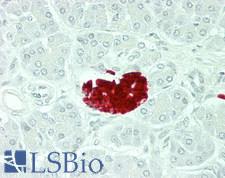
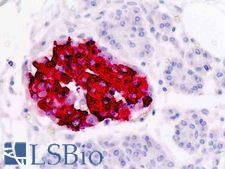
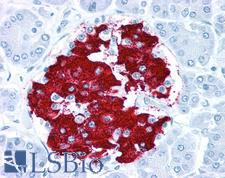
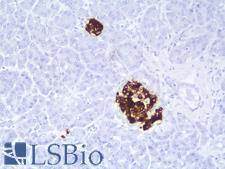
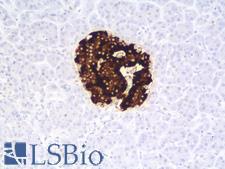
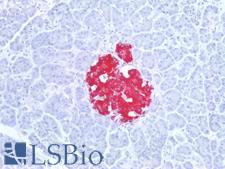
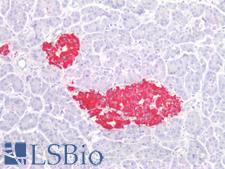
☰ Filters
Products
Antibodies
(7)
Type
Primary
(7)
Target
Insulin
(7)
Reactivity
Human
(5)
Mouse
(1)
Rat
(1)
Bovine
(1)
Pig
(2)
Application
IHC
(3)
IHC-Fr
(1)
IHC-P
(7)
ELISA
(1)
IF
(1)
SWB
(1)
Host
rabbit
(3)
mouse
(4)
Product Group
PathPlus Cancer
(7)
PathPlus Cancer Pathology
(7)
Isotype
IgG
(2)
IgG1
(2)
IgG1,k
(1)
Clonality
monoclonal mc
(3)
polyclonal pc
(2)
recombinant monoclonal rmc
(2)
Clone
D3E7 (5B6/6)
(1)
IRDN/1980R
(1)
rIRDN/805
(1)
SPM531
(1)
Format
Unconjugated
(7)
Epitope
aa1-84
(1)
Publications
No
(7)

Cancer Pathology
Cancer
Insulin Mouse anti-Pig Monoclonal (aa1-84) (SPM531) Antibody
Pig, Human
IF, IHC, IHC-P
Unconjugated
50 µg/$460

Cancer Pathology
Cancer
Insulin Mouse anti-Human Monoclonal (D3E7 (5B6/6)) Antibody
Mouse, Bovine, Rat, Pig, Human
ELISA, IHC, IHC-Fr, IHC-P
Unconjugated
100 µg/$485

Cancer Pathology
Cancer
Insulin Mouse anti-Human Monoclonal Antibody
Human
IHC, IHC-P
Unconjugated
100 µl/$375

Cancer Pathology
Cancer
Insulin Rabbit anti-Human Recombinant Monoclonal (IRDN/1980R) Antibody
Human
IHC-P
Unconjugated
100 µg/$485

Cancer Pathology
Cancer
Insulin Mouse anti-Human Recombinant Monoclonal (rIRDN/805) Antibody
Human
IHC-P
Unconjugated
100 µg/$525

Cancer Pathology
Cancer
Fast Shipping
Insulin Rabbit anti-Human Polyclonal Antibody
IHC-P, SWB
Unconjugated
50 µg/$395

Cancer Pathology
Cancer
Fast Shipping
Insulin Rabbit anti-Human Polyclonal Antibody
IHC-P
Unconjugated
50 µg/$395
Viewing 1-7
of 7
product results











